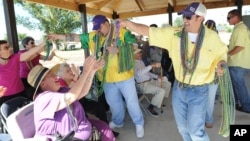Feel down about getting older? Wish your life was better? Worried about all the problems that come with age?
A new survey suggests you need only wait: Many pessimistic feelings held by people earlier in life take an optimistic turn as they move toward old age. Even hallmark concerns of old age — about declining health, lack of independence and memory loss — lessen as Americans age.
"The younger generation is less optimistic," said Dr. Zia Agha, chief medical officer at West Health, a nonprofit focused on aging issues whose related research institute released the poll Wednesday with the independent research organization NORC at the University of Chicago. "Perhaps as they age they will build resilience and they build the capacity that will help them cope better."
Generally speaking, optimism about growing older increased steadily with age, the poll found. Among people in their 30s, 46 percent described themselves as mostly or somewhat optimistic about aging, compared with 66 percent of people 70 and older. Likewise, respondents showed a decade-by-decade increase in feeling confident, not helpless, about aging, and in assessing their household finances positively.
When asked to rate their quality of life, people noted an improvement as they moved from their 50s to their 60s and beyond. Among respondents 70 and older, two-thirds rated their life excellent or very good, compared with about half of 30-somethings.
Least likely to fret about health
Among some metrics, pessimism appears to grow as people move out of their 30s into middle age before falling late in life. Those 70 and older were least likely to express worry about age bringing poor health, a move into a nursing home or memory loss. They also were least likely to fear old age could prompt them to be disrespected or become a burden on their families. People in their 60s and beyond had the lowest fear of losing their independence.
Other research has pointed to greater satisfaction, happiness and optimism among older people.
Agha said the latest survey reflected the idea that people often find in their later years a growing appreciation for facets of life they may have focused on less when they were younger, including spirituality and personal relationships. Fulfillment from those things can help bolster overall happiness, even in the face of potential physical decline.
The NORC-West Health poll also found those 70 and older were also less likely than younger people to feel that seniors are forgotten in America today or that they receive too little respect. Not surprisingly, older people were less likely to see the age of 65 as a marker of old age. About four in 10 people in their 30s regarded that number as symbolic of reaching old age, twice as large a share as those in their 70s or beyond.
The poll was based on online and telephone interviews of 3,026 adults age 30 and older who were members of NORC's nationally representative AmeriSpeak panel. It was conducted September 19 through October 21 and had a margin of sampling error for all respondents of plus or minus 2.2 percentage points.








